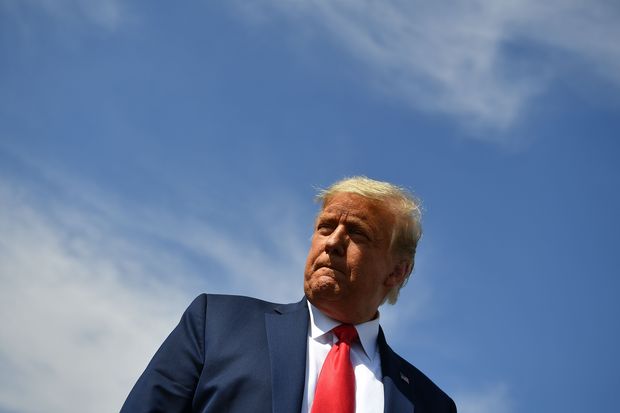
Donald Trump arrives at Phoenix Sky Harbor International Airport in Arizona on Monday. (AFP via Getty Images)
Economic stimulus talks between House Democrats and the White House look to go on for at least a bit longer, but a potential rift between Senate Republicans and the president could sink any pact that emerges.
Representatives of both the White House and House Speaker Nancy Pelosi said enough progress was made Tuesday to justify further talks Wednesday, with an aim of getting a package voted on before Nov. 3.
“We made good progress,” said Mark Meadows, chief of staff for the White House, on CNBC.
“We still have a ways to go, but I would say that the conversations today were productive enough to continue to have discussions tomorrow,” he said after Pelosi and Treasury Secretary Steven Mnuchin spoke by phone for about 45 minutes.
Going into the day, Pelosi had called Tuesday the deadline to “freeze the design” of a deal, wording seen as making the day make-or-break. Instead, both the White House and Pelosi set the end of the week as a drop-dead date.
“Today’s deadline enabled the speaker and secretary to see that decisions could be reached and language could be exchanged, demonstrating that both sides are serious about finding a compromise,” Pelosi’s deputy chief of staff, Drew Hammill, tweeted.
Meadows said the sides remained several hundred billion dollars apart and also had non-dollar-amount issues to be resolved, but the bigger danger to any potential deal may come from Senate Republicans.
Senate Majority Leader Mitch McConnell has been unenthusiastic about trying to pass a big stimulus deal in his chamber while also trying to confirm U.S. Supreme Court nominee Amy Coney Barrett.
The Washington Post also reported McConnell had told his fellow Republicans at their Tuesday party lunch that he counseled the White House against a pre-election deal.
McConnell told reporters he would put on the Senate floor a bill endorsed by the president, but he declined to say when and whether he would support it.
“If a presidentially supported bill clears the House, at some point we’ll bring it to the floor, yes,” McConnell said.
“We’d have to see what it was, first,” he replied when asked if would support a deal struck between Pelosi and the White House.
McConnell, whose grip on the majority leader post will be lost if party control in the Senate flips in the November elections, has emphasized the confirmation of Barrett — which is expected Monday — as the Senate’s top priority. It also has near-unanimous support among Senate Republicans, unlike a large stimulus deal.
But Meadows said there was no need to choose between a deal and Barrett, both of which are high priorities for Trump.
“That’s a false choice, because we can actually do both. We will do both,” he said.
Prior to the talk with Mnuchin, Pelosi said she was upbeat on the chances for a deal to be reached.
“I’m optimistic, because I do think we have a shared value. Not many, but a shared value that finally they want to crush the virus,” Pelosi said in an interview with Bloomberg Television.
“We’re starting to write the bill. And then what can happen? Negotiation.”
She said the sides remain apart on issues like aid for state and local governments wanted by Democrats, as well as enhanced coronavirus legal liability protections for businesses and non-profits sought by Republicans.
To get a bill to the president to be signed by Election Day, Pelosi said it would need to pass both chambers of Congress next week, meaning it would need to be written by the end of the current week.
Pelosi’s tone was more upbeat than President Donald Trump’s in a Tuesday morning interview on Fox News.
“They are talking. Let’s see what happens,” said Trump said.
Pelosi has stood firm on the $2.2 trillion package House Democrats pushed through, while the White House has gradually upped its offer to $1.9 trillion, while disagreeing on the composition of a deal.
McConnell won a symbolic victory on a procedural vote Tuesday to renew the dormant Paycheck Protection Program. Five Democrats, including Sen. Gary Peters of Michigan, who is in a tough race, crossed party lines to support moving the bill forward. But the margin still fell short of what would be needed to break a filibuster.
Wednesday will see a test vote for a larger $500 billion package similar to one Democrats blocked weeks ago. McConnell has said he doesn’t expect either proposal to move.
Read more: How Washington’s inability to budget could still mean a stimulus before 2021
Still, if there is no deal before the election, there’s no reason any progress made in talks to date could not be maintained as a starting point for post-election negotiations. With the government operating on a stopgap funding bill through Dec. 11, a lame-duck session of Congress after the election could approve a deal on at least some stimulus elements.
Trump, in his interview Tuesday, repeated he wanted a deal larger than what Pelosi was offering and far bigger than the packages contemplated by McConnell. He also said he saw signs that Pelosi’s hardline stance was softening.
“Now maybe she changes her tune. And I can tell you there is a little bit of that, and that would be a very positive thing for the American people,” Trump said.










